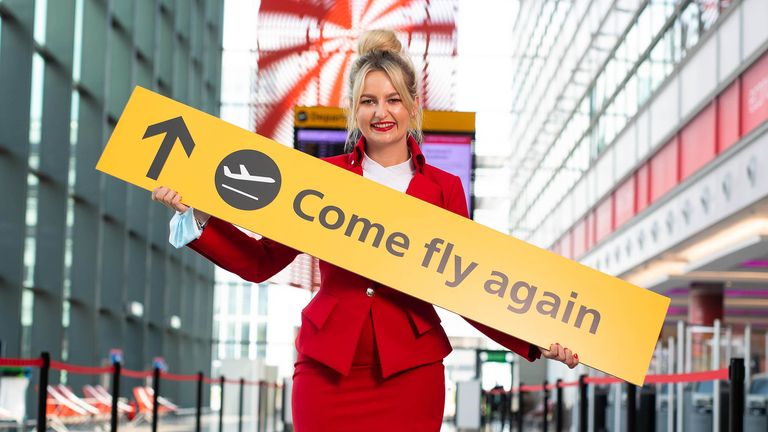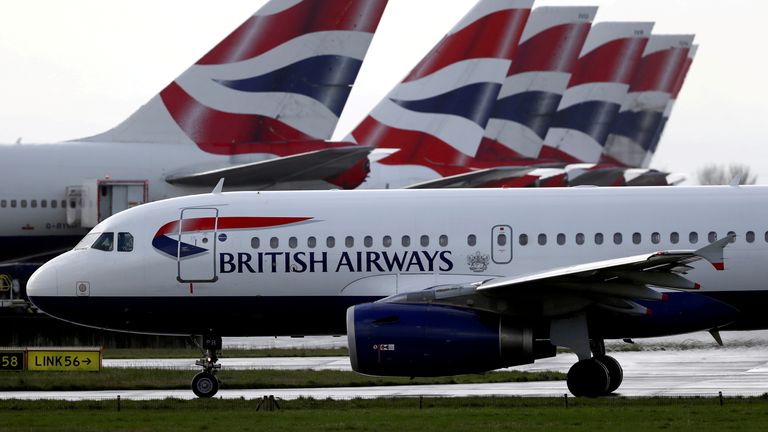Passengers using Heathrow next year could see airport charges rise by more than 50% next year, under price cap proposals released by the aviation regulator that have infuriated airlines.
The Civil Aviation Authority (CAA) said on Tuesday that the UK’s largest airport – which has suffered a dramatic decline in revenue throughout the COVID-19 pandemic – could raise its per passenger charge to between £24.50 and £34.40.
The range is below the £32 to £43 per passenger Heathrow had requested for consideration.
Live COVID updates from the UK and around the world
A final decision on the cap is expected early next year and the CAA said an interim charge of £30 per passenger – which is added to the price of a plane ticket – was to be imposed from January in the meantime.
The last cap to be set was at £22.
The proposed increase, while under what the airport had wanted over the five-year price control period, was seized upon by airlines using the UK’s hub airport as proof that the airport was placing profit over passengers.
They fear the hikes will put people off returning to the skies at a time when they too are scrambling to recover from big losses incurred during the public health emergency.
Richard Moriarty, the CAA’s chief executive, said of its plans: “While international air travel is still recovering, setting a price control for Heathrow Airport against the backdrop of so much uncertainty means we have had to adapt our approach.
“Our principal objective is to further the interests of consumers while recognising the challenges the industry has faced throughout the COVID-19 pandemic.
“These initial proposals seek to protect consumers against unfair charges, and will allow Heathrow to continue to appropriately invest in keeping the airport resilient, efficient and one that provides a good experience for passengers.
“We look forward to working with all stakeholders as we refine this package of measures in the coming months, before setting out our final proposals next year.”
Heathrow said the settlement must “safeguard a fair return for investors”.
It added: “While it is right the CAA protect consumers against excessive profits and waste, the settlement is not designed to shield airlines from legitimate cost increases or the impacts of fewer people travelling.”
However, the parent firm of British Airways IAG – which has the majority of landing slots at Heathrow – suggested the cap proposals were outrageous.
Luis Gallego, IAG’s chief executive, said: “Heathrow is already the world’s most expensive hub airport. The disproportionate increase compared to other European hubs will undermine its competitiveness even further and UK consumers will be losing out.
“A cost-efficient Heathrow would benefit travellers, businesses and the UK economy as a whole. Airport charges must be competitive if Global Britain is to become a reality.
“We will engage in the regulator´s consultation to ensure aviation can play its part to deliver this, and to advocate for UK consumers over the interests of Heathrow’s shareholders.”
His counterpart at Virgin Atlantic, Shai Weiss, accused Heathrow of “abusing” its position.
“Today’s initial proposals from the CAA fail to protect the British consumer, paving the way for Heathrow Airport to introduce unacceptable charges, just as international travel resumes at scale.
“The world’s most expensive airport risks becoming over 50% more expensive, as Heathrow and its owners seek to recoup their pandemic losses and secure hundreds of millions in dividends to shareholders.
“It is concerning that the regulator has failed in its first opportunity to step in, and together with industry partners, we will oppose these proposals in the strongest terms to protect passengers.”









